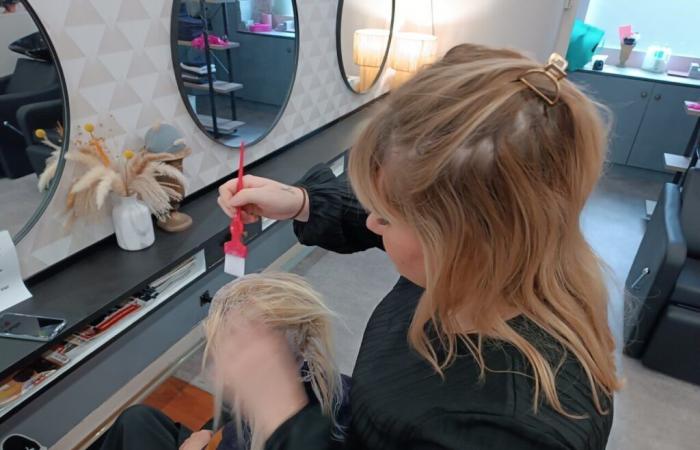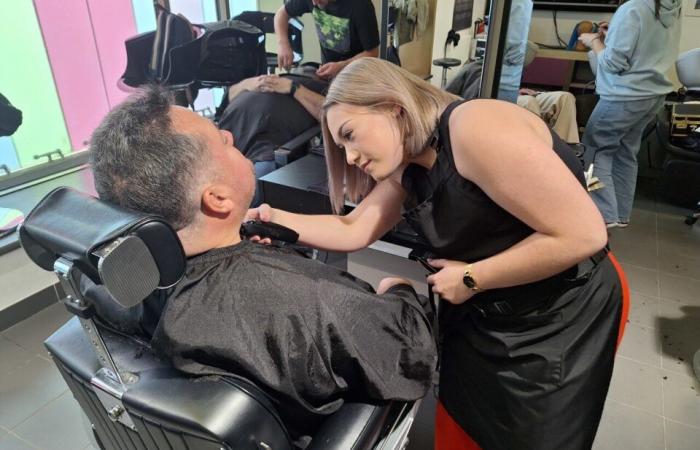Par
Julien Saliou
Published on
Nov. 7 2024 at 6:19 p.m
See my news
Follow Côté Brest
A year and a half after opening rue du colonel-Picot, in the city center of Brest, Nina Le Balch, 23, is preparing to close her hair salon, Ciseaux d'Or. It welcomes its last customers until November 9. “I am currently paid by France Travail, but not for long. Without this money, I would not be able to earn a salary, I have difficulty paying my bills (electricity, rent, credits, etc.),” explains the young woman.
She was previously employed in a salon in Kerinou, which was placed in liquidation. This was the opportunity for her to strike out on her own. Like many hairdressing professionals in recent years.
“Three out of five salons on sale”
Of the nearly 1,000 hairdressing salons in Finistère, more than half are currently for sale. “Three out of five,” even says Laurent Dermy, representative of Unec (National Union of Hairdressing Companies) in Finistère. The reasons are numerous. “After Covid, many started. Today, they have a loan to repay, and realize that managing everything is complicated. They stop. »
According to him, the closures mainly concern small structures. “Self-employed people. I get a lot of it. They have tried the adventure and come back as employees,” adds the man who is at the head of around ten salons in Cornwall.
“There was also a wave of PGE (State Guaranteed Loan) at the time of the pandemic, but it must be repaid,” points out Christelle Guénégan, Unec referent in North Finistère, and at the head of the four 100% hairdressing salons in Brest.
Rise of do-it-yourself
Customer demand has also evolved. “I do fewer colors, some have also learned to cut their hair themselves,” notes Nina Le Balch. “Do it yourself”, with the democratization of hairdressing appliances and the rise of online tutorials, is also one of the main trends in the hairdressing sector highlighted in the latest report from the Cnec (Conseil national hairdressing companies).
“Some techniques have disappeared a little, like straightening or perming, casually, it’s a loss of income,” adds Nathalie Prigent, head of the hairdressing sector at Ifac-Sup’Ifac in Brest.
“We are short of arms!” »
Christelle Guénégan raises another difficulty: recruiting staff. “We are short of arms!” The profession is no longer as attractive, hairdressers are poorly paid. We would like to give more, but we have to face the costs. Who wants to work for a minimum wage? We have young volunteers, but they often change direction. I personally closed a salon in Quimper because I couldn't find anyone to work there. »
Head to Ifac-Sup'Ifac, rue de Kerlaurent in Brest. On this career campus, dozens of young people are trained in hairdressing each year. We will not be able to know the number of apprentices, “we prefer to remain discreet for reasons of competition with other training centers. But our workforce is stable, even slightly increasing over the last eight years,” assures Nathalie Prigent, head of the hairdressing sector.
However, one number alerts him:
Upon leaving training, former apprentices do not stay in the profession for more than seven years on average. You have to be passionate.
A new development is that Nathalie Prigent regularly receives calls from employers trying to find workers.
“When we leave our home, our apprentices can easily find work. This hiring problem may also be an opportunity for them to try to negotiate their salary. »
“The wheel will turn”
“We are forced to adapt to what is asked of us. For example, the four-day week for employees has become the norm,” assures Laurent Dermy. “Many ask for Wednesdays and/or Saturdays, we walk on our heads,” regrets Christelle Guénégan.
She still wants to be optimistic. “The wheel will turn, the number of salons will eventually stabilize. »
Nina Le Balch is already looking to the future. She found her next position. She remains a hairdresser and will join the new Look's salon in Coataudon. “I will have my fixed salary at the end of the month. »
Follow all the news from your favorite cities and media by subscribing to Mon Actu.







